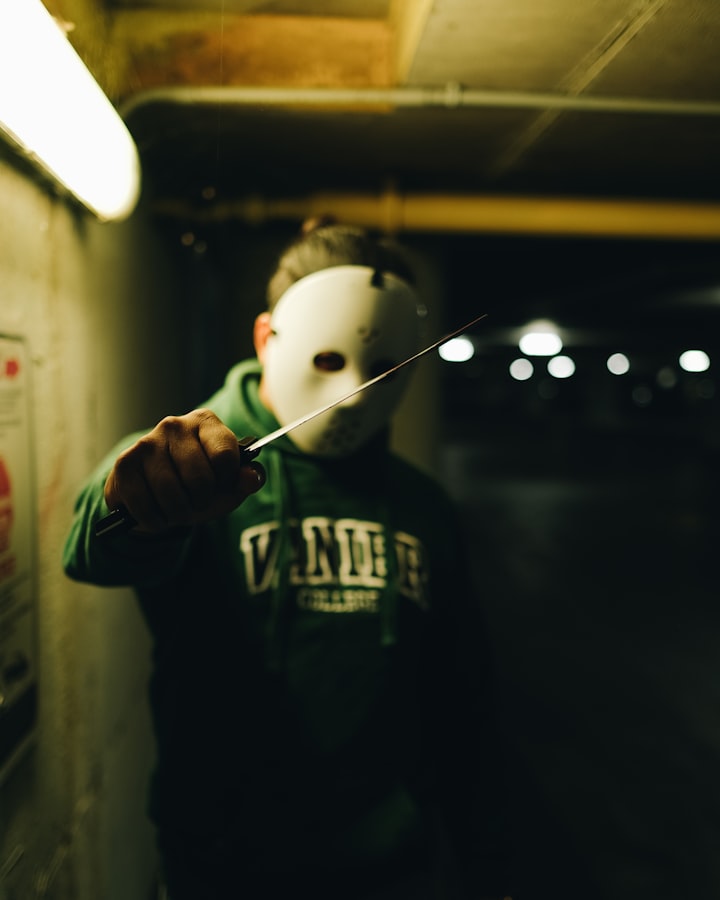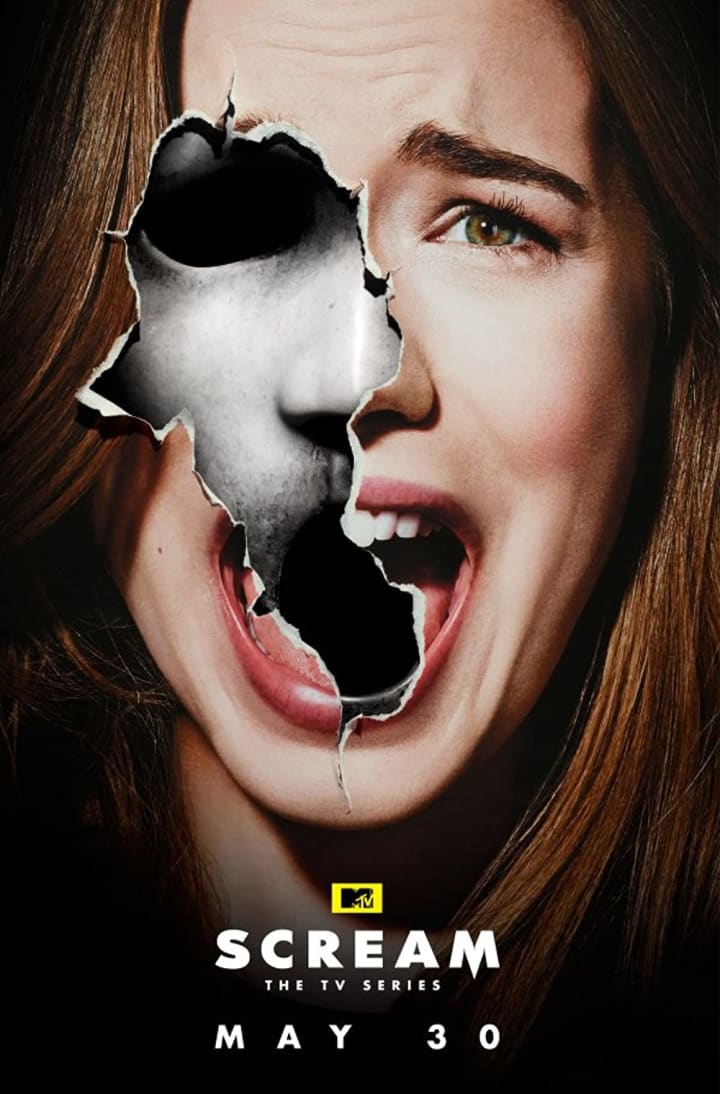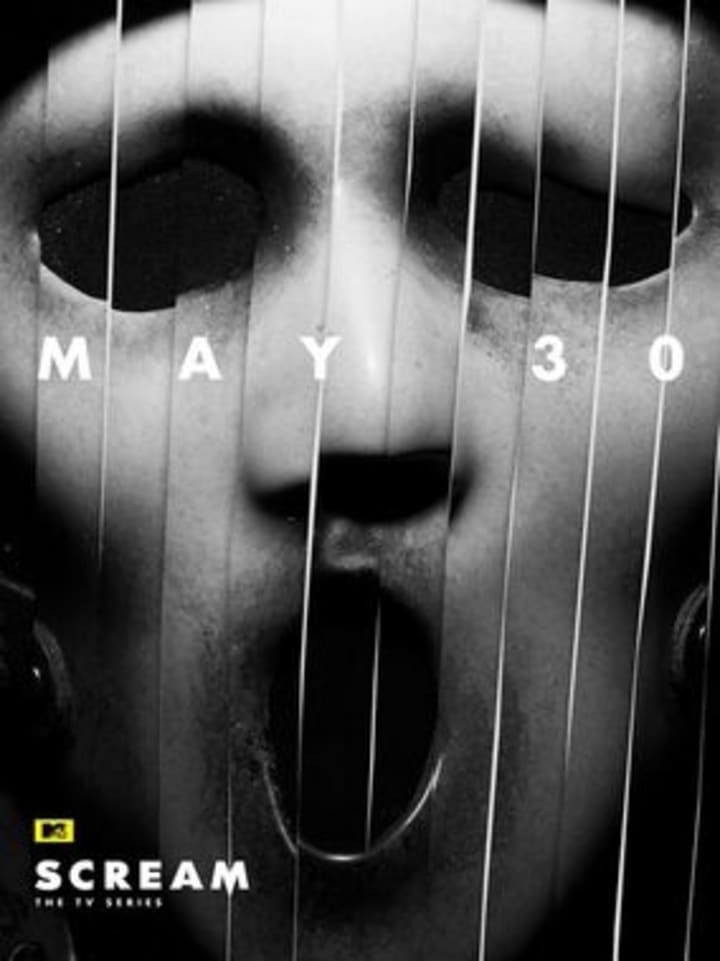8 MORE Writing Lessons From SCREAM
Making sense out of the death of a beloved franchise.

Right around Halloween, I published 8 Writing Lessons from SCREAM, a story where I examined what writers could learn from the four movies in the franchise. Now Scream is back in theatres with a new instalment, and I keep seeing Ghostface wherever I go, so I decided that the time has come to fulfil a promise I made in that original story:
If this post is well received, I might return to discuss the Scream TV show in the future.
So here we are!
Meet... Brandon James?

In 2015, MTV released a new Scream franchise to the United States. At least, that's what it said on the label, but to be clear: this is not a part of the same continuity or canon as the Wes Craven films. So is this Scream? Well, the posters said it was Scream, and teenagers are murdered, and...
Well, we're getting ahead of ourselves.
A few months later, Netflix distributed it to the rest of the world. This would be the first time that a major Scream project was written and directed without Wes Craven keeping a hand on the wheel. He wasn't gone entirely from the project, but exactly how much influence he exerted as Executive Producer is unclear. At times he was supportive of the project, and at other times he was critical of it. It's complicated!
In my last post, I mentioned a "decade-long hiatus" between Scream 4 and the reboot. That squarely ignores the existence of the Scream TV show. And you know what? I stand by that.
Don't believe the posters. This is not Scream.
Ghostface? Gone.
Sidney Prescott, Dewey, and Gale Weathers? Absent.
The dark humor? Missing.
So today, we're going to look at how the Scream TV show went so wrong, and we're going to see what other writers can learn from this show's flagrant missteps.
Scream: Season 1

If you just watch the pilot for the series, you might disagree with my stubborn refusal to accept that this is a Scream product. I am a curmudgeon who can't grow with the times, and I'm just letting my nostalgia blind me against the appeal of this show. After all, the first major sequence in the show feels like something from a Scream movie.
A teenager, played by Bella Thorne, is home alone at night, and her house seems to have bigger windows than the national average. She strips down to her bikini for a late-night soak in her hot-tub when she receives threatening contact from outside her lonely house.
You know how this goes from here. Insert murderer in a black cloak, insert screaming, and especially insert knife.
And what about that self-aware tone?
Take this line from the pilot:
You can't do a slasher movie as a TV series. Think about it. Girl and her friends arrive at the dance, the camp, the deserted town, whatever. Killer takes them out one-by-one. Ninety minutes later the sun comes up as the survivor girl is sitting in the back of the ambulance, watching her friends' bodies be wheeled past. Slasher movies burn bright and fast. TV needs to stretch things out.
Yeah, it's safe to say that we are safely in self-aware territory here.
So if this all feels like Scream, why am I being a curmudgeon? Time to bring out the rules and see what we can learn from this show.
1) Know your form.
My very first Scream-inspired rule was know your genre, but no story exists in genre alone. There's always an intersection between the genre and the form. The original Scream movie was both a slasher story and a movie. As the TV show notes, some genres (like the slasher) lend themselves to some forms (like a movie), which means that the Scream TV series is playing at a disadvantage.
Episodic content means you have more time to grow attached to characters, but there are also pauses in the performance. Ideally, a movie flows smoothly from scene to scene, where a TV show always is punctuated by the places where you're given the opportunity to check out for the night.
So how will Scream adapt to that? The slasher genre builds tension across a couple of hours, ratcheting up the violence until it achieves a bloody climax. What happens to that genre when the form works at cross-purposes with it?
2) Use time wisely.
The first Scream movie was just under two hours long, so it's the equivalent of about two and a half episodes of the TV show. The combined run-time of the two seasons of the show's original run (the Brandon James story) is almost seventeen hours long. The four Scream movies directed by Wes Craven are collectively less than half the length of the TV series.
This means that the TV series has lots of room. That can be great! In the pilot episode, the TV show explicitly writes out its goal. The self-aware character says...
You've gotta remember that the whodunnit may not be as important in our story. You need to forget it's a horror story, that someone might die at every turn. You see, you have to care if the smokin' hot lit teacher seems a little too interested in his female students. You have to care if the team wins the big game. You have to care if the smart pretty girl forgives the dumb jock. You root for them, you love them, so when they are brutally murdered, it hurts.
It sounds great in theory. However, something isn't quite working here. See, it's easy to say that the audience should care about the characters in the story, but do we?
The TV series has all of this time on its hands. These characters should be much more well-developed than their big-screen counterparts. And yet, when it was announced that Neve Campbell would be returning to the role of Sidney Prescott, the Scream fandom was excited. Would anyone be excited for the return of Emma Duval?
Having tons of space to develop your characters is one thing. Using that space wisely is another.
Long episodes pass in the TV series without anything really happening. Or, worse, all of the activity is crammed into the first few minutes and the last few minutes. It's all setting up cliffhangers and resolving cliff-hangers, and then wide gaps in the story where nothing of much consequence happens.
3) Respect contrast.
By the middle of the first season of Scream, I knew we were in trouble. The show keeps making little nods towards the sort of self-awareness that made Scream so special, but it never felt capable of capitalising on that. The Scream movies can be funny, or absurd, or meta, but they're also creepy. The mixture of those elements provided a particularly potent emotional experience. After all, each sequence could begin with goofy comedy and end with violent murder.
Scream the TV series, in comparison, lumbers through predictable motions. Characters die. Someone makes a self-aware quip that never quite adds up to humor. Long episodes pass in a drudgery as characters mourn their dead friends. She was taken too soon. She didn't deserve to die like this. After all, that's the point here, right? We're supposed to care. We're supposed to hurt.
Episodes drag by with characters walking in slow motion while moody pop-songs play in the background. The tone is generally melancholy or sombre. Is it realistic? Maybe. But do you know what it definitely is? Boring.
Scream is a reminder of the power that contrast can provide in a story, and once you notice this, you see it everywhere. When Gandalf dies, the Fellowship has contrast among the elves. When Luke Skywalker is mourning family members, the movie shifts to show us the underworld and Han Solo.
The Scream movies invite us to laugh, and to... well, scream. The Scream TV show, in contrast, just feels like someone trying to make a symphony with only one note.
4) People are complex, and your characters should be too.
Why do people like Dewey and Gale? Because they're surprising. The contrast that Scream provides on the emotional level also persists on the personal level. As the small-town deputy in a 90s slasher flick, there were expectations about what kind of character Dewey was supposed to be. When he was sweet and thoughtful but also pretty damn resilient, he was surprising.
In the Scream TV series, Emma is sad and romantically entangled. Kieran is handsome and bland. Audrey is cranky, Noah is moody, and Brooke is every popular high school girl rolled into one person.
The show started out with the promise that it would make us care about these characters. Care about what, exactly?
Scream: Season 2

The survivors from season 1 are famous, but they're also dealing with various degrees of trauma. Lingering questions from the first season continue into the second, and new relationships form and fall apart. The drama continues. And then, of course, people start to die again.
The Brandon James killer is back.
5) Respect your audience.
Lots of questions from the first season directly propel the second season, but there's one question that never gets addressed. At the end of the pilot from the first season, self-aware Noah monologues about how he thinks the story will end. It's a cute moment. I liked it!
At the very last second, Noah looks up into a rear view mirror and brushes his hair out of his eyes. And what's that? A trail of blood oozes across his forehead. He has blood on his hands? Why? Is he connected to the murders?
Eh, forget about it. It doesn't matter. At least, not as much as it leads you to think. In the next episode you're supposed to infer that it's actually just red paint from when Noah was doing some petty vandalism. That's about the level of all of the mysteries and thrills in the show. It hypes up something to be important, but then it just goes nowhere. It feels like the show wants to manipulate the audience more than it wants to entertain the audience.
6) Know your comps.
If you ever end up pitching a book, you'll probably be asked for "comp titles." Those are other books or movies, usually that were made somewhat recently, that in some way are comparable to the project you're pitching.
In the case of the Scream TV show, the project invites comparison between itself and the Scream movies. Obviously, using that title earned the show extra attention. Look at me, for instance. I only watched the show because it was titled Scream. But that appeal that brings in more viewers also brings expectations. People are inevitably going to compare the show to the movies.
In the writing world, using comps carefully is an art unto itself. In the case of Scream, we see what happens when comps go wrong. You can't help but compare the plodding Scream TV show to the lively Scream movies.
7) Reward your audience.
One of the things I praised about the original Scream movies is that each movie felt self-contained. We got catharsis at the end of every film. The killer was always killed, and there were no dangling plot-threads left to tease or promise sequels.
Considering how high the stakes were in each movie, that allowed them all to end with a sense of relief. There was no suggestion that perhaps Ghostface survived, and there were no lingering shots meant to foreshadow future instalments. Every episode felt complete.
That's what makes it especially baffling when the Scream TV show decided to swing wildly in the opposite direction. What was really going on with Brandon James? Did the season 1 killer have a side-kick? What are all of these characters trying to hide from each other? Tune in next season to find out.
Only, after two seasons, there were no more seasons to come. The show couldn't maintain viewership. It was always promising that major revelations were coming, but those promises are thin when each season is a slog of characters circling through the same dull arguments over and over again.
What was up with Brandon James? We'll never know.
8) Learn from the past.
This will probably be my final entry in this little Scream mini-series, so I want to end it with the thesis statement behind all of this.
There was no reason for the Scream TV show to suck. Four movies already provided a blueprint for how a series like this could work. Some of those movies were better than others (I liked the first two, and I felt that the franchise was getting weak by the last two), but each movie offered lessons that the TV show could have learned from. What's most baffling about this show is that it apparently decided not to bother. It doesn't just make mistakes. It makes mistakes that could have been avoided by paying attention to the movies.

Conclusion
After how much I disliked this show, it might be surprising to learn that I actually think it had a lot of potential. Most of the actors didn't do a great job, but that could have just been the direction and the script. Some actors, like Bex Taylor-Klaus who plays Audrey, actually do a pretty good job.
As well, considering the territory, I think Scream was well-positioned. It could poke fun at Pretty Little Liars or Riverdale or any other number of teens-in-scandalous-scenarios shows. That's an emerging genre that would be ripe for the kind of self-aware entertainment that the Scream movies usually provided.
Instead, the final product here is just... limp. It feels underbaked. Instead of making a self-aware version of one of those shows, the Scream TV show just made one of those shows. A few comments here and there from Noah aren't enough to make it feel fresh and lively, and that's just embarrassing.
For us viewers, this should be reminder, especially if we're viewers with a mind to become creators. We will never walk across unmarked snow. There will always be footprints ahead of us. Those footprints can guide us, and those footprints can warn us away from danger, but we have to take the time to notice them. We can learn from the people who walked here before, but to do that we have to slow down and activate our analytical tendencies.
If there's one thing that Scream has taught us, it's that following trends can be deadly. After all, you don't want to be the victim who runs upstairs in the slasher when they could be making a break for the front door.
A Final Note
I'm aware that a fifth Scream movie is currently in theaters, and I initially hoped to write about it as well as the TV shows. Unfortunately, the covid numbers in my region have made that a little bit too risky, so I've needed to hold off. I look forward to seeing it under safer circumstances in the future.

If you enjoyed this post, please consider checking out some of my other writing. If you like what you see, I'd appreciate it if you left a like and subscribed.
About the Creator
Littlewit Philips
Short stories, movie reviews, and media essays.
Terribly fond of things that go bump in the night.






Comments
There are no comments for this story
Be the first to respond and start the conversation.